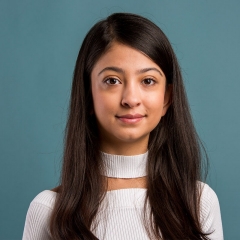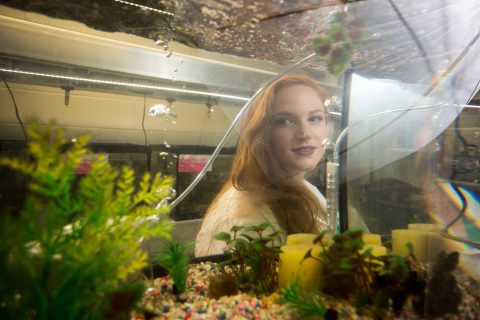Biology (BSc)
Why study Biology?
Get inspired by life. Immerse yourself in the study of life at all levels, from cell biology and the physiology of multicellular organisms to the interactions between organisms and their environment. Build a strong basis in the essentials, then choose the right topics for your chosen path.
Our Biology Department features teaching labs with state-of-the-art equipment that introduce you to the various techniques used in biology research. Small class sizes foster strong student-professor relationships. As a Biology student, you'll follow the Biology core curriculum and additional Biology courses based on your interests. Through labs, lectures and tutorials you will:
- Study genes and how they control cellular and organismal function
- Address fundamental and applied research problems
- Study the chemical and cellular basis of living systems
- Explore the evolution, biodiversity and ecology of organisms and their physiology and morphology
- Receive extensive training in research methodology
- Perform original research as an undergraduate (honours and specialization students only)
Concordia’s hands-on approach provides a solid foundation for a career in the life sciences or environmental sciences, or paves the way for future graduate studies.
Program highlights
- Innovative cross-disciplinary opportunities with Chemistry and Geography departments through the Systems and Informational Biology (SIB), and Environmental and Sustainability Science (ESS) options.
Special funding for out-of-province students
Up to $4000 for undergraduate programs.
Program structure
A Bachelor of Science degree takes a minimum of three or four years (90 – 120 credits) of full-time study, depending on your academic background.
Program options
- Honours in Biology (72 credits)*
- Specialization in Biology (60 credits)
- Major in Biology (45 credits)
- Minor in Biology (24 credits)
*Honours is a highly concentrated program, ideal for students planning to continue to graduate studies. If you are interested in Honours, speak with your program advisor in your first year of study at Concordia. Students applying to the University are able to apply to the specialization.
Students planning a career or graduate studies in the biological sciences are encouraged to follow an Honours or Specialization program. The Honours programs require a strong academic performance and a two-term undergraduate research project and thesis as a 6-credit course (BIOL 490).
The Major and Minor programs have fewer required credits in the biology curriculum than the Honours and Specialization programs and allow students to take more courses in other disciplines to fulfill the 90 credit requirement for a BSc degree. The Major includes all courses that are required for admission to most medical degree programs.
Courses
Co-op program
The Co-op program gives you the chance to complete paid work terms that last 12 to 16 weeks. As a Co-op student, you will work for firms where you may:
- characterize the effects of drug candidates in cells and/or animals
- undertake bacterial or blood smear preparations and staining
- work on gene cloning and molecular diagnostics
- act as a field assistant, with species identification, measurement and counting
Note: The Co-op program is only available for the Specialization and Honours.
United States students: A U.S. Federal Student Aid-eligible version of this program is offered. This version meets all U.S. regulations (such as no co-operative education or e-courses) for eligible programs.
Admission criteria
Minimum cut-off averages and course requirements
- Quebec CEGEP: 26
- Admission is based on the CRC requirements indicated above and completion of the following classes as part of their DEC: Calculus 1 and Calculus 2; Mechanics, Electricity and Magnetism and Wave, Optics and Modern Physics; General Chemistry and Chemistry of Solutions; General Biology (OR Cellular Biology AND Ecology and Evolution)
- Additional information for CEGEP applicants
- High School: B- overall, B- in math / sciences
- Completed courses in the disciplines of Calculus, Biology, Chemistry and Physics.
- One math from Pre-Calculus, Calculus, or equivalent
- Two sciences (from Biology, Chemistry or Physics)
- ACT or SAT is NOT required
- Canadian curricula course requirements
- Accepted international qualifications
- Completed courses in the disciplines of Calculus, Biology, Chemistry and Physics.
- International Baccalaureate (IB) diploma: 27 overall, 4 math, 4 science
- one math (Applications and Interpretations HL, Analysis and Approaches HL or Analysis and Approaches SL)
- one science (Physics, Chemistry or Biology, either SL or HL)
- one of the science or math courses must be completed at the HL level
- International Baccalaureate Career-related Programme (CP): 4.5/7 overall, 4 math, 4 science
- one math (Applications and Interpretations HL, Analysis and Approaches HL or Analysis and Approaches SL)
- one science (Physics, Chemistry or Biology, either SL or HL)
- one of the science or math courses must be completed at the HL level
- Additional Career-related Programme (CP) course requirements
- Baccalauréat français: 12 overall, 12 in math / science
- Première: Spécialité mathématiques AND Spécialité physique-chimie
Terminale: Spécialité mathématiques (also accepted, Spécialité Physique-Chimie AND Mathématiques Complémentaires)
- Première: Spécialité mathématiques AND Spécialité physique-chimie
- British system of education (GCE):
- A-levels: At least two A-level exams CD, C in math, C in science or
- AS-levels: At least 4 AS-level exams with equivalent results or
- BTEC: Level 3 Diploma or Extended Diploma in a related subject area with equivalent results
- Students without math or science A-levels may be admissible based on AS-level or iGCSE/GCSE/O-Level exam results. Students should include all their exam results from iGCSE (or equivalent) onwards to support their application.
- Additional information for British System of Education (GCE) applicants
- University Transfers (internal/external): C+ overall, C+ in math / sciences
- Completed courses in the disciplines of Calculus, Biology, Chemistry and Physics.
Minimum cut-off averages should be used as indicators. The cut-off data may change depending on the applicant pool. Applicants who meet the stated minimum requirements are not guaranteed admission to these programs.
Application deadlines

FALL ENTRY (September)
Deadline: March 1
U.S. and international applicants: Apply no later than February 1 to allow time for immigration document processing. However, applying earlier is strongly recommended. Immigration processing times vary by country and delays could prevent you from starting your studies on time.

WINTER ENTRY (January)
Deadline: November 1
U.S. and international applicants: Apply no later than August 1 to allow time for immigration document processing. However, applying earlier is strongly recommended. Immigration processing times vary by country and delays could prevent you from starting your studies on time.
We reserve the right to close admission to a program at any time after the official deadline without prior notice.
After your degree
Biology undergraduates have the foundation to pursue graduate studies or medicine. Biology alumni have established careers in a variety of science fields that include:
- Medicine
- Pharmacology
- Environmental management
- Science education
The Specialization and Honours programs prepare students for a career in the biological sciences, including graduate studies. The Major program can be combined with a degree in another department based on interest or to target niche careers that combine multiple expertise. For example, a student interested in a career in management of a biotechnology company or governmental regulatory agency might combine a Major in Biology with a major program in business or communications.
Student story

Paria Asadi
Honours in Biology
Fuelled by a passion for helping others, Paria Asadi dove headfirst into disease research at Concordia.
Other programs of interest

As a biochemist, you will study the chemical processes that occur within the cells of living organisms.
Department
Department of Chemistry and Biochemistry
Faculty

Get inspired by life. Immerse yourself in the study of life at all levels: from the edge of biochemistry through cell biology and the physiology of multicellular organisms to the interactions between organisms and their environment.
Department
Faculty

Studying Systems and Information Biology will place you at the rich intersection of biology and computer science.
Department
Faculty

As an ecologist, you will explore the connections among different organisms and their interaction with soil, air, water, and radiation from the sun.
Department
Faculty

